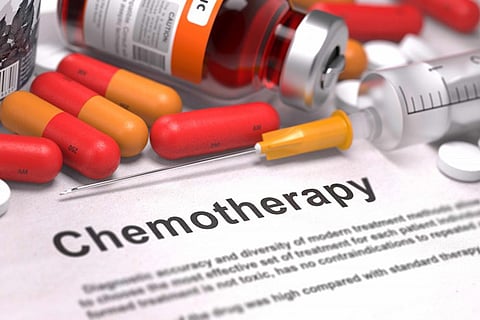

New Delhi
By shielding the brain from things that would harm it, the blood-brain barrier also blocks the chemotherapy that would help it. Now, William Walker, a researcher with the West Virginia University School of Medicine has investigated whether the blood-brain barrier is more likely to admit chemotherapy drugs at different times of day. His findings appeared in 'Frontiers in Oncology.'
His study showed that the blood-brain barrier is dynamic rather than static and suggested that properly timed chemotherapy treatments could better reach the tumors they're targeting. "We are not the first ones to show that chrono-chemotherapy is beneficial, but we're the first to show that it's beneficial in the treatment of brain metastasis," said Walker, a postdoctoral fellow in the Department of Neuroscience.
Walker and his colleagues delivered chemotherapy into mice that had breast cancer, which had travelled to the brain. Some of the mice received the treatments in daylight conditions, when mice--being nocturnal--are typically at rest. The other animals received them in the dark, a setting that more closely resembles the mice's active period.
The researchers found that the chemotherapy they administered during the dark phase killed more brain tumor cells than the ones given in the light phase. Dark-phase chemotherapy treatments also did a better job of delaying neurological symptoms, like strange walking patterns and loss of muscle control.
They also increased the median survival rate by about 20 per cent. "In all our projects, we try to ask, 'If we see an effect molecularly, does that translate? Is there a functional relevance to it?'" Walker said. "To an extent, it might be pointless if we increase the amount of chemotherapy within the brain tumor at a certain time, but we don't see any functional difference, we don't improve survival, or we don't improve changes in neurological deficit. So, these results were great to see."
But questions remained. Does the human blood-brain barrier fluctuate, too? If it does, is it more receptive to chemotherapy in the day or at night? Do the fluctuations reflect the fact that humans are diurnal creatures (more active during the day), or are they an effect of light exposure itself? "Those are the questions William Walker will be looking into when he leaves this lab and starts his own," said Randy Nelson, chair of the Department of Neuroscience, director of the WVU Center for Foundational Neuroscience Research and Education and Walker's mentor.
Typically, people on chemotherapy receive their treatments in the daytime--during regular business hours--but "if it's the case that people are more like flies, and the brain blood-brain barrier opens up at night, then that might be the best time to give chemo," Nelson said. "Chrono-chemotherapy has been shown to be beneficial for years--in terms of peripheral cancer--but for some reason, that basic science is not being translated to clinical practice," Walker said. "I think that's an important step. That's my goal in starting my own lab: to try to raise awareness so that we can actually translate some of the basic science that we see into clinical practice to improve patient outcomes."
Visit news.dtnext.in to explore our interactive epaper!
Download the DT Next app for more exciting features!
Click here for iOS
Click here for Android